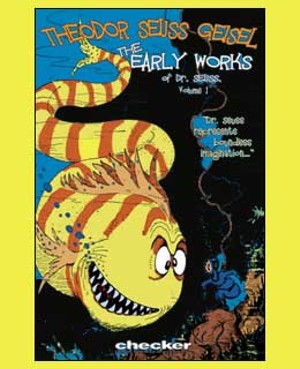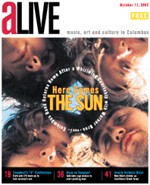Dr. Seuss, Pre-Med

By the time the commodification of Dr. Seuss is completely complete, when this generation of kids has grown up having spent more time of their formative years with Mike Myers' Cat in the Hat, the musical Seussical and TV puppet show The Wubbulous World of Dr. Seuss than they've spent reading or being read the actual work of the good doctor, the very word "Seuss" could be in danger of becoming just another brand-name.
And not the pen name of, you know, an actual, real-life artist, a real person who's incredibly individual design style, pronounced verbal wit and mastery of logical nonsense combined into some of the most widely read and influential children's books, ones which would make his unique worldview a component of generations of children's lives.
Checker Publishing's latest series of books exploring an important artist's early years (following their Winsor McCay series) offers a potent reminder of Seuss's real personhood. Not simply a logo attached willy-nilly on kids' books and sundry lesser spin-offs and adaptations, Dr. Seuss was an artist who needed to work and, before he found a niche and created his own genre, took what he could get. He could even occasionally suck.
Checker's Theodor Seuss Geisel: The Early Works of Dr. Seuss Volume 1 is a heaping helping of Seuss's non-literary work, including illustrations for a World War II educational pamphlet on malaria, ad campaigns for pens and autoparts, illustrations for joke books, some rather wordy gags for Judge magazine and political cartoons for PM and Liberty magazines.
These political cartoons, like everything else included, are all quite clearly in Seuss's signature style -- there would be no mistaking anything in this book as the work of any other artist -- but are awfully uninspired. They're simply the lazy political cartoons that you still see in daily papers using the same old visual vocabulary (Uncle Sam standing in for America, symbols for other players clearly labeled as such) with no evidence of the genius that would later give us the politically charged Butter Battle Book and The Lorax.
No evidence, but signs that presage them and most everything else he'd do later: the strange vehicles and instruments, elephants that are clearly Horton's ancestors, and so on. Collecting work from the period when Dr. Seuss clearly already had his Ph.D. in whimsy but hadn't yet opened up his own practice, Theodor Seuss Geisel is a must for his adult fans, evidencing the fact that no artist, no matter how eminent he becomes or how, um, wubbulous his rep, ever develops in a complete vacuum.



